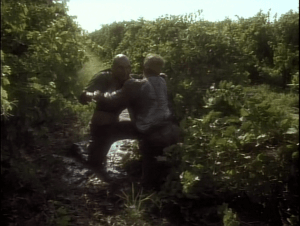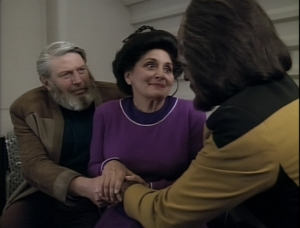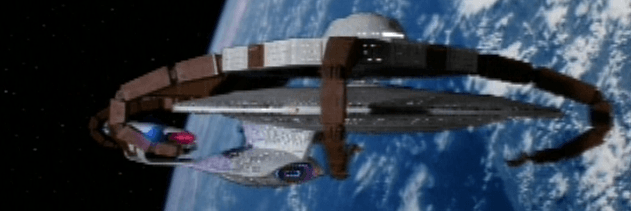Welcome back for another ‘Final Frontier Friday‘! When I realized that this week’s column was going to fall on December 23, my first impulse (because I am just that shameless) was to wonder if I could find a ‘Star Trek’ episode that was even vaguely Christmassy. It took all of five seconds for me to realize how insane that was. I mean forget anything as explicit as a putting Christmas tree on the bridge, or going caroling on the holodeck, I’m pretty sure I could count on one hand the number of times Christmas is even mentioned in this franchise! So that thought vanished as quickly as it arrived. But maybe there was something thematically appropriate? What are the holidays – not just Christmas, but this whole time of year – about if not family? And certainly there’s plenty of family in ‘Star Trek’, whether it’s Kirk calling Spock a brother or the rich relationship that was developed between Ben and Jake Sisko. But the single episode that best deals with family in the ‘Star Trek’ universe is, arguably, the aptly-titled ‘Family’.
That’s right! We’re taking our first look at an episode of ‘Star Trek: The Next Generation’!
While it absolutely fits the theme I was going for this week, I have to admit I felt a bit odd including this without having covered the ‘Best of Both Worlds’ two-parter. While ‘Family’ is a perfectly satisfying episode on its own, you can’t escape the fact that it was designed to function as an epilogue of sorts to ‘The Best of Both Worlds’. The connections mainly lie in the setup (the Enterprise has returned to Earth for repairs) and in Picard’s story, as he recovers from his experience with the Borg. While this might present some minor issues with treating ‘Family’ as a standalone story, it also gets to the heart of why the production staff felt it was such an important episode to make, despite the preference of the show (and, really, most shows of the time) to avoid serialized storytelling to whatever extent they could. Producer Michael Piller recalled his argument in favor of bending the show’s format, noting that “Next week, Picard can be fine, but for a show that prides itself on its realistic approach to storytelling, how can you have a guy who’s basically been raped be fine the next week?” In dealing with this, the episode presents a trio of storylines, each centered in some way on a crewmember’s family. The primary focus, of course, is on Picard as he copes with his trauma, but we also get subplots focused on Worf and Wesley Crusher.
 As the Enterprise undergoes repairs in Earth orbit in the wake of the recent Borg invasion, Captain Picard returns home to France as he recovers from his abduction and assimilation by the Borg. As he arrives at his family’s vineyard in La Barre, we are introduced to his brother Robert, sister-in-law Marie, and young nephew Rene. He is met on the road by Rene, who hints – as only a child can – at the differences between the Picard brothers. Robert is something of a traditionalist, eschewing many of the twenty-fourth century’s technological conveniences in favor of things like home cooked meals, while Picard more eagerly embraces these advances and joined Starfleet rather than tend the vineyard. After speaking with an old friend who is working on a terraforming project, He finds himself thinking about leaving Starfleet to head that project. Though he denies this is a result of his experience with the Borg, it’s clear that even he may not believe that. Having learned of this, Robert presses Picard about what happened to him, accusing him in as many words of running away and of having done so in the past. Picard retorts with echoes of their childhood rivalry, and as wounds both old and new are torn open, the two brothers are soon brawling in the mud. The fight ends with the two laughing, but Picard’s laughter turns to tears when Robert gently tells him that he’s been too hard on himself. As the Captain finally acknowledges the feelings of powerlessness and inadequacy he’s dealing with, his brother reminds him that whether he remains in Starfleet or not, this is something he’ll have to learn to live with. With this catharsis behind them, the brothers go inside for a drink where Marie finds them, still caked in mud. Before returning to the ship, Picard explains that he belongs in Starfleet, adding that he now knows exactly where to go if he should ever doubt that again.
As the Enterprise undergoes repairs in Earth orbit in the wake of the recent Borg invasion, Captain Picard returns home to France as he recovers from his abduction and assimilation by the Borg. As he arrives at his family’s vineyard in La Barre, we are introduced to his brother Robert, sister-in-law Marie, and young nephew Rene. He is met on the road by Rene, who hints – as only a child can – at the differences between the Picard brothers. Robert is something of a traditionalist, eschewing many of the twenty-fourth century’s technological conveniences in favor of things like home cooked meals, while Picard more eagerly embraces these advances and joined Starfleet rather than tend the vineyard. After speaking with an old friend who is working on a terraforming project, He finds himself thinking about leaving Starfleet to head that project. Though he denies this is a result of his experience with the Borg, it’s clear that even he may not believe that. Having learned of this, Robert presses Picard about what happened to him, accusing him in as many words of running away and of having done so in the past. Picard retorts with echoes of their childhood rivalry, and as wounds both old and new are torn open, the two brothers are soon brawling in the mud. The fight ends with the two laughing, but Picard’s laughter turns to tears when Robert gently tells him that he’s been too hard on himself. As the Captain finally acknowledges the feelings of powerlessness and inadequacy he’s dealing with, his brother reminds him that whether he remains in Starfleet or not, this is something he’ll have to learn to live with. With this catharsis behind them, the brothers go inside for a drink where Marie finds them, still caked in mud. Before returning to the ship, Picard explains that he belongs in Starfleet, adding that he now knows exactly where to go if he should ever doubt that again.
Meanwhile, Worf’s adoptive human parents come aboard and immediately present a stark contrast to the typically reserved Klingon. A gregarious couple, his father Sergei quickly bonds with O’Brien (as a fellow enlisted man) and LaForge (he has “all the specs and diagrams” of Galaxy-class ships at home), his mother Helena dotes on them both. Though they avoid broaching the subject with Worf, it quickly becomes clear that his parents are concerned about him following his recent discommendation (a Klingon penalty that saw him shunned and stripped of his family’s honor and social standing). When they finally do confront Worf with their concern, he admits that he wasn’t sure he wanted them to come aboard, that while he is glad to see them, he feels he must bear his dishonor alone. Like the loving parents they are, Sergei and Helena remind him that nothing could be farther from the truth.
 Finally, in the briefest of the episode’s subplots, Dr Crusher retrieves a footlocker of her late husband Jack’s belongings from storage. This includes a holographic message Jack recorded when Wesley was born. As Beverly explains, he intended to record others but was killed before he had the chance. Though she initially hesitates to give Wesley the recording, as he has finally come to terms with his father’s death, she ultimately does. Wesley visits the holodeck with the recording and finds a touching message from a version of his father who is not much older than Wesley himself.
Finally, in the briefest of the episode’s subplots, Dr Crusher retrieves a footlocker of her late husband Jack’s belongings from storage. This includes a holographic message Jack recorded when Wesley was born. As Beverly explains, he intended to record others but was killed before he had the chance. Though she initially hesitates to give Wesley the recording, as he has finally come to terms with his father’s death, she ultimately does. Wesley visits the holodeck with the recording and finds a touching message from a version of his father who is not much older than Wesley himself.
It’s a bit of a cliché to say that ‘The Next Generation’ didn’t get good until its third season. It’s definitely not wrong. The first season was a mess, and the second was a definite improvement. But while it had finally become the show we all know and love by the third season, the fourth was arguably the show’s first truly great season. Why is that? Well, the glib answer would be that the stories were just better. And they are. But as this episode demonstrates, the show was also beginning to focus on the characters in ways they hadn’t always done. Now, that’s not to imply that it was as character driven as ‘Deep Space Nine’ would become, but it was a step along that road, and ‘Family demonstrates that perhaps as well as any.
It’s not just an episode that shows what our characters are dealing with, it’s one that shows new sides of them. The best example of this is the depiction of Picard’s relationship with Robert. Both his brother’s penchant for tradition and the bits of family history that are revealed throughout the episode have the effect of painting the famously stuffy Captain in a more rebellious light than might be expected, especially with regard to his family. And of course, Patrick Stewart offers just as magnificent a performance as you’d expect in his scenes with Robert, especially during the fight in the vineyard and the subsequent mending of fences.
Additionally, the characterization of Worf’s parents, in particular, is very effective. While they can be a bit over the top at times, we nonetheless know exactly what kind of people they are, practically before they’ve stepped off the transporter pad. But as much as their presence tends to be played for laughs and as exasperated as Worf often appears by their outgoing nature or doting behavior, there is never any doubt of the genuine love between the three.
 While the Wesley story is somewhat perfunctory – almost an afterthought, really – I’ve always found it more memorable than the Worf plot, which is given considerably more screentime. I’m not entirely sure why that is. Perhaps it’s the simple emotional resonance of getting a “new” message from a lost loved one. Maybe it’s because the brevity of the story ensures that it doesn’t overstay its welcome. Even though the message itself could be summed up as boilerplate “new dad stuff”, Wil Wheaton’s reactions are what really sell it, particularly a moment when the holographic Jack (himself a Starfleet officer) wonders about his son’s interest in Starfleet as Wesley looks down at his own uniform, and another in which Wesley reaches out for his father just as the hologram vanishes. As broad as Worf’s parents can get, and as heavy as Picard’s issues are, it’s the nuances and subtleties that make Wesley’s story work.
While the Wesley story is somewhat perfunctory – almost an afterthought, really – I’ve always found it more memorable than the Worf plot, which is given considerably more screentime. I’m not entirely sure why that is. Perhaps it’s the simple emotional resonance of getting a “new” message from a lost loved one. Maybe it’s because the brevity of the story ensures that it doesn’t overstay its welcome. Even though the message itself could be summed up as boilerplate “new dad stuff”, Wil Wheaton’s reactions are what really sell it, particularly a moment when the holographic Jack (himself a Starfleet officer) wonders about his son’s interest in Starfleet as Wesley looks down at his own uniform, and another in which Wesley reaches out for his father just as the hologram vanishes. As broad as Worf’s parents can get, and as heavy as Picard’s issues are, it’s the nuances and subtleties that make Wesley’s story work.
What are your thoughts on ‘Family’? Am I just trying way too hard to be topical? (Yes.) Let me know what you think in the comments, and we’ll be back in two weeks!

